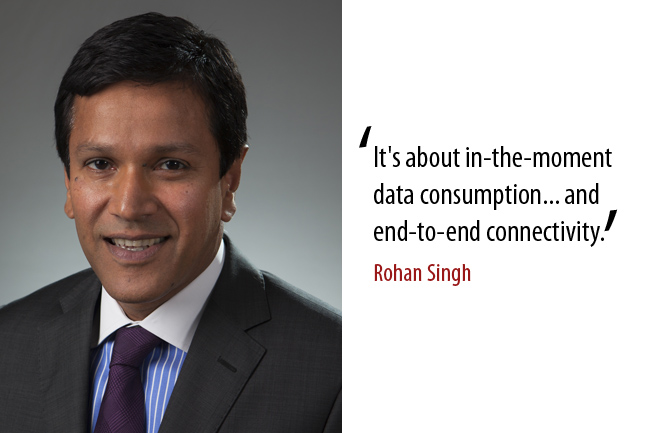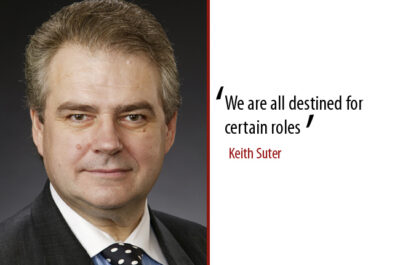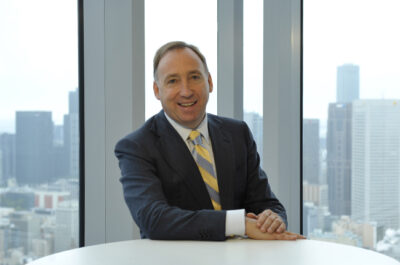Trains, Amazon, Northern Trust and Rohan Singh
Northern Trust has been probably the most successful provider of securities services in Australia, in terms of new business wins, over the past several years. Patrick Liddy, a former securities services executive himself, speaks with Rohan Singh, country head of Northern Trust in Australia and New Zealand, while putting his unique spin on the story.
At the beginning of the 20th century railways were at their peak, both in terms of overall track distance and number of people employed. By 1945 the glory days had moved into decline. The Pennsylvania Rail Road Company saw the trends and did what every good business should do – they asked themselves “What business are we in?” The astute question was answered with the rather silly answer of “Why? The railroad business. (You idiot)”
But a huge change was occurring in the way the American nation travelled. What had been a railroad country was now car country. Between 1945 and 1964, non-commuter rail passenger travel declined an incredible 84 per cent, as just about every American who could afford it climbed into his or her own car, relishing the independence. What also changed was not just the way Americans travelled, but also the way they worked, shopped, and played.
It worked out that Pennsylvania Rail Road Company was not in the railroad industry afterall; it was in the travel and transport industry. Alas, they failed to see the disruptive effect of cars and trucks. The company could well have benefited by diversifying first into trucking and then into airlines – an early ‘Fedex’ – but that’s easy to say with hindsight.
Great changes and opportunities can often pass existing entrenched participants. Disruption occurs and to avoid it you must at least have a clear understanding of what business you are really in.
Amazon is a disruptive business model. The world may see Amazon as an online bookshop. The founder of Amazon, Jeff Bezos, sees it far differently. His business is about selling products online, gathering data and enriching the customer experience. He sees this as a virtuous circle where low costs pull in customers and high volumes pull in merchants. On the way much disruption is occurring.
Amazon now carries 230 million items for sale, far more than the nearest competitor – Walmart, it has the world’s largest cloud business and it is just introducing a ‘wow’ of a phone with a ‘firefly’ option that allows you to purchase just about anything you want.
This disruption is causing many businesses to fall by the wayside and many others to prosper. It has vastly benefited consumers. When asked what business he is in, Bezos is likely to say: “I’ll sell anything, to anyone anywhere.”
Worldwide custodians are facing major disruptions. Their business model was built on extraction about 5 basis points of revenue on clients assets held and now the market has moved to 2.5 basis points of ‘client extraction’. (This extraction includes fees, FX and interest income).
Many custodians are making serious changes to the way they operate, or in the case of NAB, for instance, as confirmed this week, simply exiting the market. The question that too few seem too able to answer is: “what business are we in?” One of the few custodians who can answer that question succinctly is Northern Trust.
The country head of Northern Trust in Australia and New Zealand, Rohan Singh, answers the question without the slightest hesitation. “Northern Trust is in the business of providing information for portfolio oversight and operating model support, allowing clients to successfully enable investment strategies and meet reporting obligations,” he says. Be this risk information, portfolio information, market information, Northern Trust provides its clients with it and it provides it in real time.
And, I must say, the market in Australia is lapping up that message. Recent wins for Northern Trust include EISS, IAG and ACT Treasury.
It does not surprise that Rohan gets it so right. He understands this business intimately. His thorough schooling started at the hand of State Street’s ever-canny and highly effective Bob Williams. After six years with State Street he joined Citibank’s Singapore custody outfit and shot quickly through the ranks with a number of successful wins. And if there is one thing that Americans value, it’s winners. Clearly, Rohan is one of those.
After 10 years at Citi he took a calculated risk and joined Northern Trust, in 2008. He liked the model of being “a total specialist custody play.” He says: “The people in charge know the custody business, they are custody people and support clients to the extreme.” Plus he adds: “The humility of senior management was very refreshing”.
On the Australian market, Rohan sees quite a paradox, as it is extremely price competitive – and has two players with over 60 per cent market share at this point – but with the market starting to fragment fast. The dominance of the major two is starting to dissipate.
Rohan says that Australian clients are “incredibly important to us”. It is also the place where the large asset pools are already in existence. It is a place that has “changed little yet a lot.”
As Rohan puts it: “The functions are similar but the technology has vastly improved. It’s about in-the-moment data consumption, counter-party risk, oversight of the operating model, complete end-to-end connectivity and governance.”
Put simply, all the business that Northern Trust is in is what the punter needs to make successful investment decisions. Many of Rohan’s competitors would love to have such a clear understanding of what their business does.










